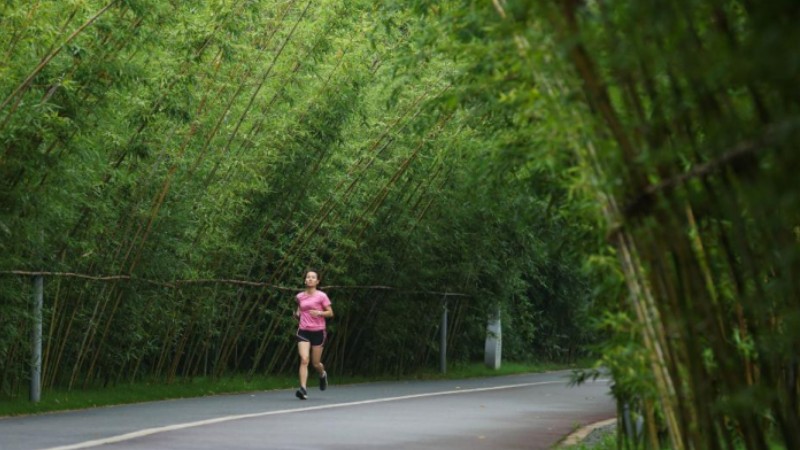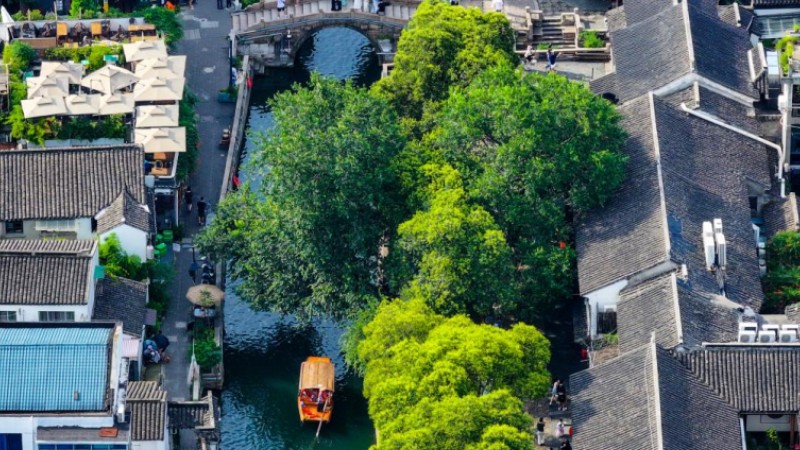Millennium-old terraces in SW China's Yunnan glow with new vitality
The Honghe Hani Rice Terraces, created by people of various ethnic groups, mainly including the Hani people, more than 1,300 years ago in Honghe Hani and Yi Autonomous Prefecture, southwest China's Yunnan Province are embracing new vitality thanks to protection and development over the past 10 years.
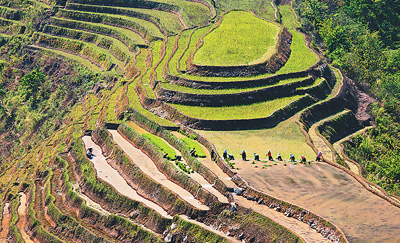
File photo shows farmers transplanting rice seedlings in terraced fields in Daxing township, Lyuchun county, Honghe Hani and Yi Autonomous Prefecture, southwest China's Yunnan Province. (Photo/Zhang Hongke)
The terraces, which cascade down the slopes of the Ailao Mountains to the banks of the Honghe River, and achieve harmony between nature and humans, are a miracle of farming civilization featuring a symbiotic agricultural ecosystem of forests, villages, terraces, and rivers.
In 2013, the Cultural Landscape of Honghe Hani Rice Terraces, located in several counties including Yuanyang, Lyuchun and Jinping of Honghe, was inscribed on the UNESCO World Heritage List. The Honghe Hani Rice Terraces are also a Globally Important Agricultural Heritage System and a nationally important agricultural heritage site in China.
To protect the terraces, people have been designated to ensure the unimpeded flow of water in channels and ditches there.
Ma Youming in Niujiaozhai township, Yuanyang county is one of them.
"Water is essential to the terraced rice fields. It is our task to well protect the water distribution system of the terraces," Ma said.
People of various ethnic groups in the prefecture reached consensus on protecting forests that ensure water for the terraces over 1,000 years ago. Local villagers have been selected to serve as forest rangers for this purpose.
Chen Zhengkang, a forest ranger in Lyuchun county, receives a subsidy of 8,000 yuan ($1,105) a year from the work. "Forests sustain the water needed for the terraces. Protecting the forests is to protect the terraces," the ranger said.
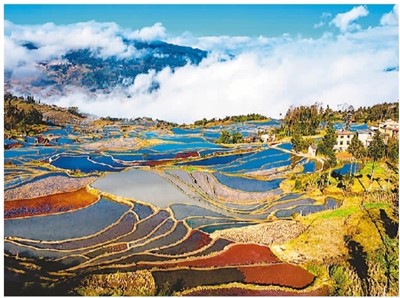
A view of terraced fields in Duoyishu village, Yuanyang county, Honghe Hani and Yi Autonomous Prefecture, southwest China's Yunnan Province. (Photo/Lu Zhong)
The prefecture has guaranteed the symbiotic agricultural ecosystem of forests, villages, terraces, and rivers in the heritage region through 10 years of efforts, like turning marginal farmland into forests, establishing a nature reserve, protecting basic farmland, and formulating regulations for the protection of the terraces. In Yuanyang, the vegetation coverage and forest coverage in the heritage region reached 67 percent and 49.6 percent, respectively.
Traditional villages have also been preserved. In Azheke village in Yuanyang, traditional houses, known locally as "mushroom houses" because of their structure, serve as part of the picturesque local landscape.
However, the village once faced challenges, as traditional dwellings were in disrepair and many villagers planned to turn them into reinforced concrete houses.
To tackle the challenges, in 2018, the county and Sun Yat-sen University developed a plan that included villagers as shareholders in a local tourism development firm. The plan aimed to encourage villagers' participation in the development of rural tourism by leveraging unique local natural and cultural resources and to attract villagers to protect the traditional village through the development of tourism. As a result, traditional dwellings have been renovated with modern facilities and retained their original characteristics, and Azheke has become a dynamic village.
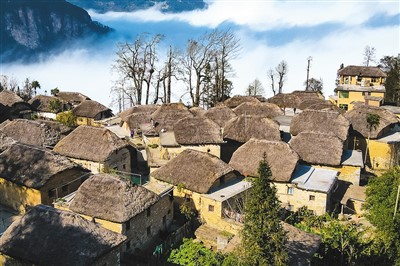
Traditional houses, known locally as "mushroom houses," in Azheke village, Yuanyang county, Honghe Hani and Yi Autonomous Prefecture, southwest China's Yunnan Province. (Photo/Long Jun)
Thanks to the implementation of the plan, traditional dwellings have attracted more and more tourists while boosting villagers' incomes.
Hani polyphonic folk music has been passed down for generations by the Hani people, who usually sing traditional folk songs while working in the terraced rice fields. The ancient Hani songs, a national intangible cultural heritage, do not have any written lyrics, and people must pass down the songs by teaching them to each other.
Chen Xiniang, a national-level inheritor of the art form, started to learn Hani songs when he was eight years old. Many young people learn the songs from him. So far, two of his students have become provincial-level inheritors of Hani polyphonic folk music.
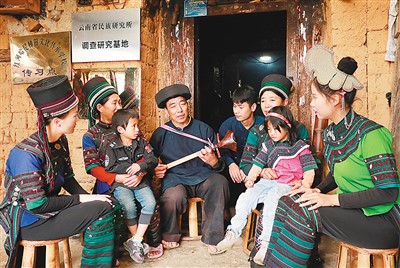
Chen Xiniang (center), a national-level inheritor of Hani polyphonic folk music, which is a national intangible cultural heritage, and local villagers in 2021. (Photo/Hu Yanhui)
Hani polyphonic folk music is also spreading internationally. The traditional music was performed at the Expo 2015 in Milan, Italy.
As Hani songs gain popularity, Yuanyang county has integrated Hani's traditional farming culture with tourism. In April this year, the county held an activity to mark the 10th anniversary of the Cultural Landscape of Honghe Hani Rice Terraces being inscribed as a UNESCO World Heritage Site. During the event, a live performance of Hani songs was hosted, and tourists experienced transplanting rice seedlings and Hani's farming culture in the terraced rice fields.

File photo shows a long street banquet in Lyuchun county, Honghe Hani and Yi Autonomous Prefecture, southwest China's Yunnan Province. (Photo/Liang Rongsheng)
The local governments have used the Honghe Hani Rice Terraces to broaden the channels for farmers to increase their incomes over the past decade by developing tourism, promoting Hani's traditional ecological farming model combining rice cultivation, fish farming, and duck raising, and advertising farm produce and specialties through the internet.
Thanks to these efforts, the average disposable income of farmers in the heritage region has increased from 3,928 yuan in 2013 to 12,502 yuan in 2023.
Photos
Related Stories
- Ancient terraces in E China included on World Heritage Irrigation Structures List
- Stunning scenery of red soil terraces dazzles visitors to Rongxian in SW China
- Honghe Hani Rice Terraces in SW China’s Yunnan: a masterpiece of the local people
- Hani girl explains traditional terrace farming as Spring comes
- The terraced fields on mountains in NW China
- Terraces shrouded by clouds in south China's Guangxi
Copyright © 2023 People's Daily Online. All Rights Reserved.







